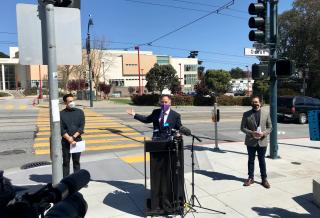New Bill Seeks Fairness and Prevents Potentially Escalating Police Stops for Jaywalking

Jaywalking is arbitrarily enforced throughout California. When it is cited, tickets are disproportionately given to people of color, and sometimes, these encounters with police turn life-threatening. In an effort to reform this unfair system, Assemblymember Phil Ting (D-San Francisco) has introduced AB 1238, The Freedom To Walk Act, which would decriminalize jaywalking.
“Whether it’s someone’s life or the hundreds of dollars in fines, the cost is too much for a relatively minor infraction,” said Ting at a San Francisco press conference. “It’s time to reconsider how we use our law enforcement resources and whether our jaywalking laws really do protect pedestrians.”
AB 1238/The Freedom To Walk Act promotes the fair and equitable use of roadways by:
- Legalizing crossings, when safe, outside of a crosswalk or against a traffic light
- Stopping the undue financial burden on low-income violators, as fines can total hundreds of dollars, if not more, because of added fees tacked on by the court, county, city and other jurisdictions
- Preventing police from using jaywalking as a pretext to stop Black and Brown people, especially since under-resourced neighborhoods often lack adequate crossing infrastructure
“Jaywalking laws do more than turn an ordinary and logical behavior into a crime; they also create opportunities for police to racially profile. A stop for harmless jaywalking can turn into a potentially life-threatening police encounter, especially for Black people, who are disproportionately targeted and suffer the most severe consequences of inequitable law enforcement,” said Jared Sanchez of the California Bicycle Coalition (CalBike), sponsor of AB 1238.
While there are many examples of California cases in which a jaywalking stop has gone wrong, the most recent case occurred in September when San Clemente Police killed Kurt Reinhold. In the Bay Area, Chinedu Okobi was killed more than two years ago in Millbrae by San Mateo County deputies. And in 2017, Nandi Cain was beaten by Sacramento Police. The victims in each of these cases were African American, and video captured each incident.
The numbers behind police stops for jaywalking are just as telling. From 2018-2020, data compiled by the California Racial and Identity Profiling Act (RIPA) shows Black Californians are severely overrepresented when it comes to being stopped for jaywalking, up to four-and-a-half times more than their White counterparts.
“Jaywalking citations criminalize low-income communities of color and do not advance public safety or deter jaywalking,” said Rio Scharf, Equal Justice Works Fellow with the Lawyers’ Committee for Civil Rights of the San Francisco Bay Area (LCCRSF). “We can have safe streets without criminal punishment for walking — and we have seen this to be true in wealthy, white neighborhoods where jaywalking occurs but citations are not enforced.”
Jaywalking laws were enacted in the 1930s by the emerging auto industry, which saw the number of deadly car accidents skyrocket in the prior decade and wanted to shift the blame from drivers to pedestrians. Over the years, street designs primarily considered the needs of drivers, failing to account for people who aren’t in cars.
California has already begun making changes. Up until 2018, it was illegal for people to cross the street at a traffic light when the pedestrian countdown meter began. AB 1238 would go further, repealing the state’s remaining jaywalking laws. Other countries, like the United Kingdom, have shown it can be done safely. The U.K. allows pedestrians to cross the street mid-block, yet it has roughly half as many pedestrian deaths as the United States.
Just this month, Virginia became the first state to decriminalize jaywalking, and the New York Attorney General recommended last summer that its state do the same. California is expected to begin debate on AB 1238 next month during its initial committee hearing.
# # # # #